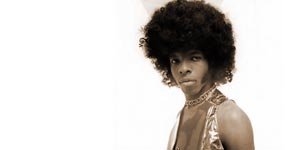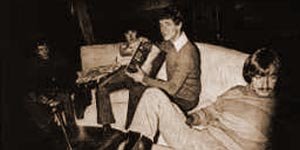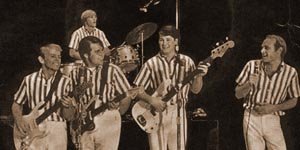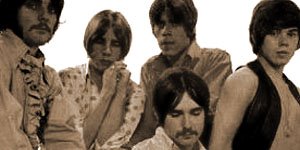The Beat Goes On, Part XV.

060. Sly & the Family Stone “Don’t Call Me Nigger, Whitey”
(Sylvester “Sly Stone” Stewart)
1969
Available on Stand!
It's a stretched-out hard-blues pyschedelic soul jam, like “Yer Blues” only good; actually, on second thought, it’s closer to acid jazz than anything else that would exist for the next twenty years, outside of some George Clinton joints. Sly scats junkily through several layers of studio equipment which weren’t meant to transmit the human voice (Peter Frampton, eat your heart out). Interestingly, the title and chorus is not so much a plea for racial harmony as a double-barrelled threat from both races to each other. Yeah. Sly gets how we do the whole racial thing in America.
059. The Velvet Underground “After Hours”
(Lou Reed)
1969
Available on The Velvet Underground
Ladies and gentlemen, Maureen “Mo” Tucker, the Velvet Underground’s drummer, patron saint of all indie bands who have a girl somewhere in there (along with Tina Weymouth and Kim Gordon), and the most real-voiced person on this list. Of course the song, gentle, wistful, and only barely snotty, sounds nothing like the layman's image of the Velvet Underground (except maybe for Doug Yule’s overfed bass); it’s a waltz, for God’s sake. Still, its children outnumber the stars in the sky and the sands of the desert: every indie rock and lo-fi song has the sound of this song hardwired in its DNA.
058. The Beach Boys “I Get Around”
(Mike Love/Brian Wilson)
1964
Available on Sounds of Summer: The Very Best of the Beach Boys
Forsaking their usual themes of surfing, cars, and school, Brian and the boys jump all over the Italo-macho trip that Dion, Frankie Valli, and those guys have been burning up the charts with over on the East Coast. Predictably, they defang it. (“It wouldn’t be right/To leave your best girl home on a Saturday night”? Fricking wimps.) But at the same time, they up the ante sonically: that wall of voices totally crushes the Belmonts, the Four Seasons, and any other pretenders to the male-harmony crown. While we might not believe that the Beach Boys are as badass as they say, we certainly believe in the power of their music.
057. Status Quo “Pictures of Matchstick Men”
(Francis Rossi)
1968
Available on Picturesque Matchstickable Messages from the Status Quo
Status Quo, of course, are famous as the prototype for Spinal Tap; their career went from fluffy British Invasion to gooey psychedelia to boring-ass hard rock to lunkheaded glam-metal, and they were stunningly average in each genre. Except for this song, this one song, which is more or less a bubblegum Jimi Hendrix Experience, flanged all to hell. Except theres’s some odd churchy chording going on, too, which they nicked from the Yardbirds, and some watery processed vocals which everyone was doing in 68. But no matter how derivative, second-rate, or unsatisfying a band might be, a killer riff covers a multitude of sins (just ask Deep Purple). And this killer riff, a pointilist Indian thing, gets bonus point for being stolen by, oh, every rap-rock group ever.
056. Marvin Gaye & Tammi Terrell “Ain’t No Mountain High Enough”
(Nickolas Ashford/Valerie Simpson)
1967
Available on Hitsville USA: The Motown Singles Collection
In many ways this can be considered the ultimate Motown song, so perfect in its soar and stomp that it can bring tears to your eyes; especially that chord change on the bridge. Which is the reason it’s such a popular song to cover: you can’t not feel good while singing it. (Whether anyone else needs another version, of course, is beside the point.) Even though Marvin was a star in his own right (and would become even more of one in the next decade), this was a perfect pairing; like the cliché about Fred Astaire and Ginger Rogers goes, he gives her class, while she gives him sex. Really; this might be the raunchiest female vocal Motown ever recorded, and it’s still a paragon of classiness.
055. Aaron Neville “Tell It Like It Is”
(George Davis/Lee Diamond)
1966
Available on The Very Best of Aaron Neville
I first heard Aaron Neville as a special guest on a Kenny G album (my parents were sadists), so for a very long time I thought of him as an adult-contemporary wuss balladeer, like Sadé or Regina Belle but without balls. When I found out about this song, and the Neville Brothers as a whole, a wholesale mental reorganization of my understanding of the universe itself had to take place. His fluttering falsetto paved the way for Al Green and Marvin Gaye’s sensitivization of soul in the 70s, not to mention followers like Luther Vandross, D’Angelo, and, uh, R. Kelly. Of course the backing is rolling New Orleans rather than chugging Memphis, but the emphasis remains squarely on that high, sobbing sound: one of the most immediately distinctive voices in all of popular music.
054. The Troggs “With a Girl Like You”
(Reg Presley)
1966
Available on The Best of the Troggs
The reason punk rock is, and remains, relevant is that it strips away anything inessential and states its case in the most simple, unadorned way possible. This is true whether the case being stated is the evils of U.S. foreign policy (Dead Kennedys), the necessity of rebellion even when it will ultimately achieve nothing (Sex Pistols), or the way shared junk culture and a sense of irony can create meaning even for disaffected teenagers (Ramones). Or, as with this song, how cool it is to be around a girl you love. Rhythmically, it belongs to the “At the Hop” school of teen-pop, but the chunky guitar bursts and unpremeditated sweetness of the lyrics point to a post-British Invasion sensibility, like all garage bands. This is the most gentle and romantic punk-rock song ever.
053. Jeff Beck “Morning Dew”
(Bonnie Dobson/Tim Rose)
1968
Available on Truth
It’s unfortunate that the band who produced two of the best hard-rock albums of the late 60s should be so much overshadowed by the later activities of its members. Jeff Beck, of course, remains one of the great guitar heroes, not as revered as Clapton, Page or Hendrix and all the better because of it. Rod Stewart learned to sing in front of an audience here (the story goes that he was so shy that he originally sang from behind the amplifiers); Ron Wood developed his signature funky guitar style on bass; Mick Waller’s drumming is on a level with Bonham and Moon; and piano god Nicky Hopkins got better showcases than the Stones, the Who, or any other London band ever allowed him. This song is just a folk tune, Becked out in style. No one was doing as much with atmosphere and sonic sculpturing as these guys, at least until Zeppelin stole just about every one of their plays.
052. Ray Charles “I Can’t Stop Loving You”
(Don Gibson)
1962
Available on Modern Sounds in Country & Western Music
So did this make Ray a country star or bring country into the r&b world? Neither, really; it remains a beautiful oddity, outside of time and space. (Though of course the two were always more or less the same thing with differently-colored faces. Don’t tell anyone.) The continuing climbing from chord to chord gives the circular, vaguely dull lyrics some drama, which the annoyingly white backing choir does its best, but fails, to leach away. Not many soul singers could have released something like this and remained an inimitable genius: Charles could, did, and is.
051. Big Brother & the Holding Company “Piece of My Heart”
(Bert Berns/Jerry Ragavoy)
1968
Available on Cheap Thrills
Turn it up. Keep turning it up. Crank that volume until the bleeding guitar licks hit with the dust-scattering force of a sledgehammer, and then you’ll be ready for it when it comes. The music builds, pauses, builds again, like the tide coming in, waves crashing on “break it” and “take it,” the music builds, Sam Andrew’s guitar lines snaking up the crest, until suddenly there’s this heart-stopping pause, and then, and then: that single magnificent scream of pain and glory, the greatest shout in rock & roll, a blood-curdling panther’s yowl, real, unmixed, so much more powerful than the overdubbed “yeah!” in “Won’t Get Fooled Again.” It’s the only time in recorded history that a white girl outsang a black girl on the black girl’s own song, but Erma Franklin who? Every one of Janis’s improvised bits, slowing-downs and catching-ups, ooh babys and repetitions has become indelibly part of the rhythm of the song. This is why Janis Joplin is a rock goddess. No more is needed.
Next: 050-041. >>

No comments:
Post a Comment